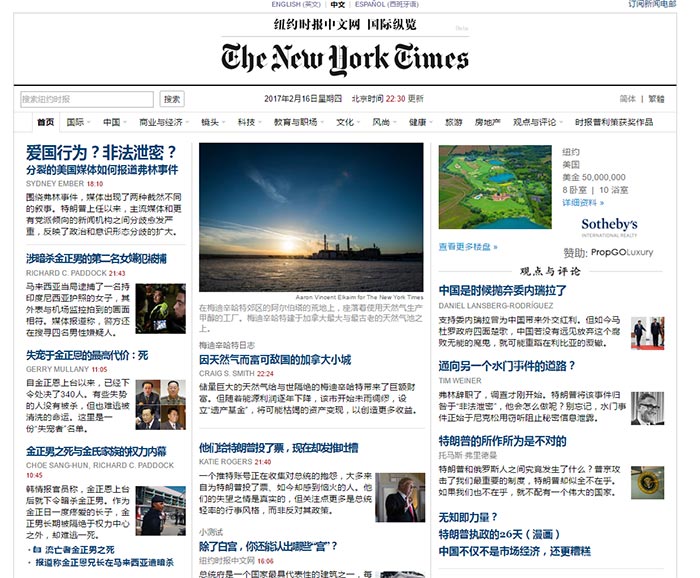Index relies entirely on the support of donors and readers to do its work.
Help us keep amplifying censored voices today.
[vc_row][vc_column][vc_column_text]

The New York Times is blocked in China.
Last month, China’s Ministry of Industry and Information Technology unveiled the country’s a new 14-month campaign to tighten control over the internet. The Chinese government is specifically concerned about virtual private networks, which punch holes through the country’s so-called “Great Firewall”. Without the VPNs, China’s internet users are unable to browse some of the world’s largest web sites. So the campaign made big news around the world.
But Charlie Smith of the 2016 Index on Censorship Digial Activism Award-winning GreatFire, an anonymous collective fighting Chinese internet censorship, told us that the VPN campaign is “actually kind of being mis-reported by the press, in general. It’s not as big a deal as it is being made out to be. We’d make a lot of noise if it was a big deal.”
Here are just six sites that are regularly blocked by China’s Great Firewall:
YouTube was first blocked in March of 2008 during riots in Tibet and has been blocked several times since, including on the 25th anniversary of the Tiananmen Square protests in 2014. At the time of the Tibetan riots, much of China’s population speculated that the YouTube ban was an attempt by the government to filter access to footage that a Tibetan exile group had released.
It’s typical for China’s internet censors to go into overdrive during politically sensitive events and/or time periods, which is why it doesn’t come as a surprise that Instagram was blocked in 2014 after pro-democracy protests in Hong Kong. To some, the block on Instagram during the protests exposed Beijing’s fears that people in the mainland might be inspired by the events taking place in Hong Kong. While some parts of the social media site may be restored, the site is still listed as 92 percent blocked.
In late December 2016, the Chinese government made waves by ordering Apple to remove their New York Times app from the Chinese digital app store. According to the newspaper, the app had been removed on 23 December under regulations prohibiting all apps from engaging in activities that endanger national security or disrupt social order. The New York Times website as a whole has been blocked since 2012 in China, after the newspaper published an article regarding the wealth of former prime minister Wen Jiabao and his family. People turned to the NYT app after the blockage in order to maintain access to the the paper’s stories. Now that the app is blocked as well, the New York Times is only available to those who had downloaded the app before its removal from the store.
In June of 2012, the popular business and financial information website published a story regarding the multimillion dollar wealth of Vice President Xi Jinping and his extended family. Considering this story too invasive, the Chinese government blocked Bloomberg and has yet to reopen the site to the public. At the time, the Chinese government was going through a period of transition, as power shifted from then President Hu Jintao to Jinping.
Censors in China blocked access to Twitter in June of 2009 in anticipation of the 20th anniversary of the pro-democracy protests in Tiananmen Square. The move seems to reflect the government’s anxiety when it comes to the anniversary and the sensitive memories that come with it. The blocking of Twitter has also allowed for the rise of the Chinese app Weibo, a censored Twitter clone, which quickly became one of China’s most popular.
One of the more recent bans by the Chinese government came in the form of the international news agency Reuters. In March 2015, the organisation announced that both its English and Chinese sites were no longer reachable in the country . China has blocked media outlets like Reuters in the past, but these moves have always come after the release of a controversial story. In the case Reuters, the ban seemed to have come out of nowhere, with the reason behind the blockage still unclear.[/vc_column_text][/vc_column][/vc_row][vc_row][vc_column][vc_basic_grid post_type=”post” max_items=”4″ element_width=”6″ grid_id=”vc_gid:1487260644692-d841ab7e-8ed3-4″ taxonomies=”85″][/vc_column][/vc_row]
For the first time in its five-decade history, the whole board of the Foreign Correspondents’ Club of Thailand (FCCT) has been accused of committing lèse majesté, a crime with a maximum jail sentence of 15 years. The board, includes three British nationals including the BBC’s Bangkok correspondent Jonathan Head, and three American nationals, including two working for Bloomberg and the Wall Street Journal. Read more here